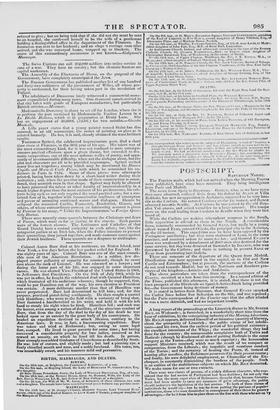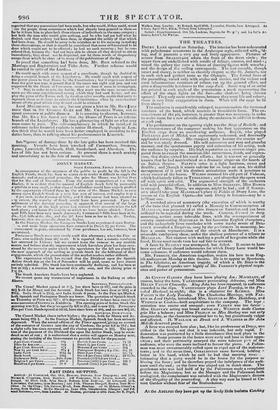There were two classes of persons, of a widely different
character, who con- sidered that the last session of Parliament had been fruitless ; for not only the Tories, but the more eager class of Reformers, thought that, because Govern- ment had been unable to carry any measures of great advantage, the public should underrate the legislation of the last session. To both of these classes of individuals he would say—lint he was far from putting the partians of popular institutions, those who were dissatisfied in consequence of their thirst for greater advantages,—far be it from him to place them on the line with those who not on ly regretted that any concessions had been made, but who would, if they could, wrest :f.om the people those concessions which had already been granted to them;-- far be it from him to place both those classes of individuals in the same category ; but both the man who would give nothing, and he who bad got half what he desired, said that nothing had been done, or disputed the utility of that which bad been done. He should be sorry to be mistaken as to his meaning in making those observations, or that it should be considered that more still remained to be done which ought not to be effected ; he had no such meaning ; but he con- sidered that, because the - had not been able to obtain all they desired to (dada immediately, they shoul.. not he dispirited, nor let those words of despondency escape them which he Wiser cd in many of the publications of the day.
In proof that something had been done, Mr. RICE referred to the Marriage and Registration and Tithe Acts. Further reforms would be carried in spite of the Lords-
, He would speak with every respect of a coordinate, though he doubted its being a coequal, branch of the Legislature. He would speak with respect of the power given to that 11011,e by the Constitution ; but if experience derived from the past was true, it proved that if the cause was right and just, and was supported by the !louse of Commons, sooner or later it must be triumphant. • " But, in order to gain t he battle, they must use the same means—they must use the same COOStH1111011:11 affefley which they had used before, and not play the game of the Tories, and, 11./ bunting ey'ter novelty, enable that party to reproach them as de .irons to subvert the Constitution. when by coasiitudonal means all the good which they desired could be attained.
Lord Mt:ii:outt i , we ser, has not given a hint to Mr. Rice. any more than to Sir Gronce Gem. and Mr. CHARLES WOOD, not to
spout nonsense at public dinners It is amusing to observe, however, that Mr. Rice has found opt that the House of Peers is an inferior branch of the Legislature. He has a glimmering of light on what may soon come to pass. The self complacency in which he indulged in reference to his financial exploits is rather ill-timed. People in Lon- don think that he would have been better employed in attending to his duties here, than in talking about his performances in Limerick.



























 Previous page
Previous page